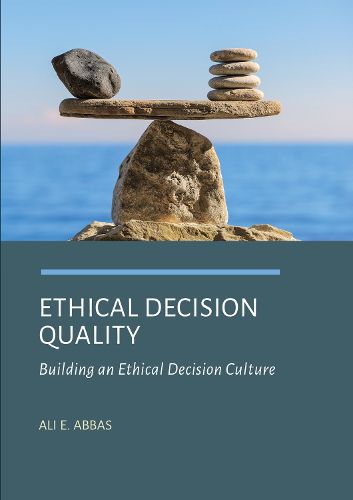Readings Newsletter
Become a Readings Member to make your shopping experience even easier.
Sign in or sign up for free!
You’re not far away from qualifying for FREE standard shipping within Australia
You’ve qualified for FREE standard shipping within Australia
The cart is loading…






This title is printed to order. This book may have been self-published. If so, we cannot guarantee the quality of the content. In the main most books will have gone through the editing process however some may not. We therefore suggest that you be aware of this before ordering this book. If in doubt check either the author or publisher’s details as we are unable to accept any returns unless they are faulty. Please contact us if you have any questions.
Organizational decision-making and ethics have often been treated as different topics. This separation impacts both the ethical quality of decisions and the quality of ethical decisions. Decision analysis provides a wealth of tools that can help decision-makers achieve clarity of action and can capture uncertainty and preferences in decisions with ethical implications. Further, decision analysis provides many insights into decision traps that are relevant to decisions with (and without) ethical implications. Decision analysis also highlights situations where individuals become reluctant to change a course of action because of the sunk cost bias, even if a change is appropriate and even if it has ethical implications.
Despite these (and many other) well-known human biases in decision-making, decision analysis has not been fully integrated into the teachings of ethics. On an organizational level, teaching ethics without a focus on decision analysis can render the teachings irrelevant to organizational decisions and can steer the focus towards deterministic reasoning that overlooks uncertainty and ignores a wealth of knowledge on traps, biases, and normative methods for making decisions.
This book is written for anybody interested in learning about and researching ethical decision-making. It can be used in classroom discussions that combine ethics and organizational decision-making. It is also particularly relevant for MBA and Executive MBA programs.
$9.00 standard shipping within Australia
FREE standard shipping within Australia for orders over $100.00
Express & International shipping calculated at checkout
This title is printed to order. This book may have been self-published. If so, we cannot guarantee the quality of the content. In the main most books will have gone through the editing process however some may not. We therefore suggest that you be aware of this before ordering this book. If in doubt check either the author or publisher’s details as we are unable to accept any returns unless they are faulty. Please contact us if you have any questions.
Organizational decision-making and ethics have often been treated as different topics. This separation impacts both the ethical quality of decisions and the quality of ethical decisions. Decision analysis provides a wealth of tools that can help decision-makers achieve clarity of action and can capture uncertainty and preferences in decisions with ethical implications. Further, decision analysis provides many insights into decision traps that are relevant to decisions with (and without) ethical implications. Decision analysis also highlights situations where individuals become reluctant to change a course of action because of the sunk cost bias, even if a change is appropriate and even if it has ethical implications.
Despite these (and many other) well-known human biases in decision-making, decision analysis has not been fully integrated into the teachings of ethics. On an organizational level, teaching ethics without a focus on decision analysis can render the teachings irrelevant to organizational decisions and can steer the focus towards deterministic reasoning that overlooks uncertainty and ignores a wealth of knowledge on traps, biases, and normative methods for making decisions.
This book is written for anybody interested in learning about and researching ethical decision-making. It can be used in classroom discussions that combine ethics and organizational decision-making. It is also particularly relevant for MBA and Executive MBA programs.